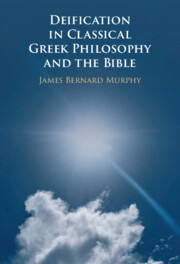Book contents
- Deification in Classical Greek Philosophy and the Bible
- Deification in Classical Greek Philosophy and the Bible
- Copyright page
- Dedication
- Epigraph
- Contents
- Introduction
- Chapter 1 Theology as Anthropology, Anthropology as Theology
- Chapter 2 Heroic Deification in Ancient Greek Religion
- Chapter 3 Ironic Deification in Socrates
- Chapter 4 Civic Deification in Plato
- Chapter 5 Developmental Deification in Aristotle
- Chapter 6 Deification as Intimacy with God in the Bible
- Conclusion
- Acknowledgments
- Select Bibliography
- Index
Chapter 5 - Developmental Deification in Aristotle
Published online by Cambridge University Press: 10 July 2024
- Deification in Classical Greek Philosophy and the Bible
- Deification in Classical Greek Philosophy and the Bible
- Copyright page
- Dedication
- Epigraph
- Contents
- Introduction
- Chapter 1 Theology as Anthropology, Anthropology as Theology
- Chapter 2 Heroic Deification in Ancient Greek Religion
- Chapter 3 Ironic Deification in Socrates
- Chapter 4 Civic Deification in Plato
- Chapter 5 Developmental Deification in Aristotle
- Chapter 6 Deification as Intimacy with God in the Bible
- Conclusion
- Acknowledgments
- Select Bibliography
- Index
Summary
Aristotle’s theology is best understood in relation to Plato’s. Like Plato, Aristotle offers no science of god, but he does offer philosophers a way to immortalize themselves through the study and contemplation of the cosmos. First, Aristotle arrays all classes of substances, from the elements to the gods, in a single progressive hierarchy. Every substance in the cosmos, he says, strives to become as much like god as its own nature permits: each class of substance perfects itself by imitating the class above it. A person’s life, says Aristotle, develops through the classes of plants, animals, and humans—before striving to imitate the divine by contemplating the stars. We become like the god by climbing the ladder of classes of substances. Second, Aristotle’s god governs the cosmos not by managing it but purely by being an example of perfection—an example that magnetically draws all things toward him. The perfect happiness enjoyed by god inspires all other classes of substances to love and to imitate him. Similarly, a philosopher governs his household and his city not by managing them, but merely by the attractive power of the example he sets of godlike happiness.
Keywords
- Type
- Chapter
- Information
- Deification in Classical Greek Philosophy and the Bible , pp. 213 - 266Publisher: Cambridge University PressPrint publication year: 2024

